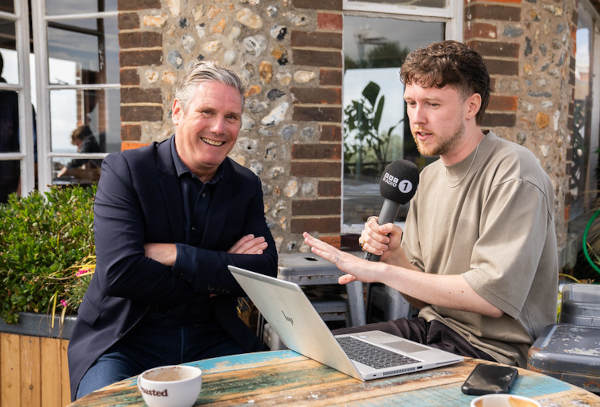
Who is Sir Keir Starmer?
Britain's new Prime Minister
Linguapress
WITH AUDIO ►: Click to open/close audio player
The people of Britain have chosen a new Labour government, after 14 years of the Conservatives. The new Prime Minister, Sir Keir Starmer, has promised that lots of things will change.

Sir Keir talking informally over a coffee, to a reporter from the BBC
After fourteen years of Conservative government, British voters decided that it was time for a change, and since 5th July 2024, Britain has a new Labour government, and a new Prime Minister, Sir Keir Starmer.
Sir Keir (note: with the title Sir, we use a person's first name, not their family name) is rather different from most politicians. He has not spent all his life as a politician; indeed he did not become a Member of Parliament until the age of 52, when he was elected to the House of Commons.
Although he has been a member of the Labour Party all his life, Keir Starmer has spent most of his working life as a lawyer. After graduating with a degree in Civil Law from the university of Oxford in 1986, he specialised in criminal law and human rights. As a young lawyer, he became the legal officer of Britain's national council for civil liberties, defending civil rights in Britain and also in some Commonwealth countries. Then in 1990 he was one of the lawyers who defended, for free, two Greenpeace activists in the famous McLibel case, against the McDonald's corporation. This case lasted for over ten years, and ended up with victory in the European Court of Human Rights. It was later made into a film by Ken Loach.
In 2008, Starmer was appointed to the position of Director of Public Prosecutions, one of the most important jobs in the British legal system; as DPP, he did not hesitate to prosecute Members of Parliament for financial irregularities and other illegal activities.
As a lawyer, and particularly as DPP, Starmer found himself working on the borderline between public life, politics and the law; and by 2014, he had decided that he could achieve greater results by going into politics. He put himself forward as a candidate for the Labour Party, and in 2015 he was elected MP for part of London.
At the time, the Labour Party was in serious difficulty; it needed a new and more popular leader, and Starmer was soon seen as the party's best hope. After the Labour Party lost its fourth general election in a row, Sir Keir was chosen as the party's new leader in 2020, in the hope that he could help the party back to power. It was not an easy job, and at first Starmer found it hard to convince people that they could depend on the Labour party again. But eventually he managed to revive the Labour Party's fortunes, and win the 2024 General Election with a very big majority.
As Prime Minister he has the difficult job of rebuilding Britain's reputation in a dangerous world and an insecure Europe. He must also try to solve Britain's great domestic problems of increasing poverty and inequality, damaged public services, and the environment.
Childhood and background
Keir Starmer was born in London in September 1962. His father was a toolmaker and his mother was a nurse. His family moved out to the suburbs of London when Keir was a small child, and at the age of 11 he passed his "11 plus" exam and got a place at Reigate Grammar School. In those days, Reigate Grammar was a state school; but while Keir was a pupil the school chose to become independent. As an independent school, Reigate Grammar had to charge fees, but Keir was able to continue in the school, as his fees were paid by a charity.Keir took A levels in maths, physics and music, and then went on to study law at the university of Leeds, in the north of England. After Leeds, he took a postgraduate degree in Civil Law at the university of Oxford. Interestingly, he also attended London's top Guildhall School of Music, and plays the piano, the flute and the violin.

Conservative: on the right of politics - Labour: socialist, on the left of politics - Prime Minister: the head of the British government, but not the head of state. House of Commons: the legislative assembly of the British parliament, equivalent of the US House of Representatives - general election: legislative election - MP: Member of Parliament.
Other vocabulary:
lawyer: legal specialist, attorney - libel: saying bad but possibly untrue things about a preson/organisation - appoint: nominate - prosecute: take legal action against, charge - achieve: obtain, reach - convince: persuade - eventually: in the end - poverty: being poor - environment: the natural world - suburbs: places at the edge of a city - state school (Britain) - public school (USA) - fees: money - a charity: a non-profit association that helps people - A levels: exams taken at the end of secondary school - degree - university diploma -
Return to Linguapress site index
Printing: Optimized for printing
Copyright © Linguapress. Do not copy this document to any other website
Copying
permitted for personal study, or by teachers for use with their
students
Student Worksheet
Sir Keir Starmer - Britain's Prime Minister
Interactive exercise - use on screen or on paper: articles and determiners.Most of the articles (a, an, the) and possessive determiners (his, etc.) have been removed from this extract from the text ; put back the missing articles or other determiners into the text, but only when they are needed. Take care; in some cases, nothing is needed. In these cases select Ø .
Although
he has been
member of
Labour Party all
life, Keir Starmer has spent most of
working
life as
lawyer. After graduating with
degree in
Civil Law from
university of Oxford in 1986, he specialised in
criminal law and
human rights.
As
young
lawyer, he became
legal officer of Britain's national council for
civil liberties, defending
civil rights in Britain and also in
Commonwealth countries. Then in 1990 he was one of
lawyers who defended, for free, two Greenpeace
activists in
McLibel
case, against
McDonald's corporation. This case lasted for over
ten years, and
ended up with victory in
European Court of
Human Rights. It was
later made into
film by Ken Loach.
famous In 2008, Starmer was appointed to post of Director of Public Prosecutions, one of most important positions in British legal system; as DPP, he did not hesitate to prosecute Members of Parliament for financial irregularities and other illegal activities.
famous In 2008, Starmer was appointed to post of Director of Public Prosecutions, one of most important positions in British legal system; as DPP, he did not hesitate to prosecute Members of Parliament for financial irregularities and other illegal activities.
Creative writing: question forming
Students should imagine themselves in the position of a journalist, interviewing Sir Keir Starmer for a newspaper in their country. They should think up at least six questions to ask Sir Keir, using different question structures, and imagine how Sir Keir might answer them.Here are the beginnings of six different questions. You can write your questions in the box, or on a sheet of paper.
When ?
Where ?
Why ?
Did you ?
Do you think ?
Have you ?
Where ?
Why ?
Did you ?
Do you think ?
Have you ?
For
teachers:
Language points:
Use of articles When using this text in class, or giving it to students to work on as private study, take care of the use of articles and other determiners. The gap-fill multiple-choice exercise above highlights a part of the text where students may need to think carefully wither an article is needed, or not. (see Articles in the Linguapress Descriptive Grammar of English).Titles in English: We say Mr. Starmer (pronounced Mister) , but Sir Keir Starmer, or Sir Keir. One should never say "Sir Starmer"
Though it contains quite a bit of specialist vocabulary, concerning the British political and education system, this is not a difficult text. For a brief guide to the British parliamentary system see The British Parliament on About-Britain.com.
Phonetics. Standard English pronunciation (IPA transcription). Note the words lawyer [ˈlɔɪ jə] which rhymes with Goya, and law [ lɔː ] which rhymes with more.
Creative writing: question forming
This exercise can also be the basis of oral pair work, with students taking the roles of journalist and Sir Keir, and asking and answering the questions orally.Differences between the written and recorded versions of the text:
These differences do not change any meaningsWritten Oral
Although though
position of post of
jobs positions
best chance best hope
depend on trust
very big massive
Other ideas?
EFL teachers: Help develop this resource by contributing extra teaching materials or exercises.
To contribute click here for further details
This teaching resource is © copyright Linguapress 2024
Republication on other websites or in print is not authorised
| Linguapress; home | Découvrez l'Angleterre (en français) | Discover Britain |




